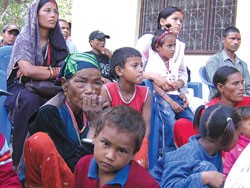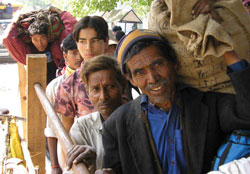|
|
| BACK TO WHERE THEY BELONG: Refugees in Nepalganj last week on their way to a bus station to go home for Dasain, for the first time in ten years. Children born in refugee camps (below) also wait for the bus to Jumla, a home they have never seen. |
For the first time in a decade, Akal Bahadur Shahi will be able to celebrate dasain in his own home in the remote Kalikakhetu village of Jumla.
Eight years ago, local Maoist cadres forced him to leave his village and told him never to return. Homeless and impoverished, Shahi's family became nomads moving to Nepalganj, then to Surkhet and eventually to India in search of poorly-paid jobs.
"Hopefully, this misery will not happen again to us," says Shahi, who is excited to be bringing his six-year-old son Bimal home for the first time.
Another villager, Sairup Shahi, is also heading home. The Maoists drove his family out seven years ago because his brother was a NC worker.
"All the time, we were so desperate to celebrate dasain in our own home and finally we can do that," explains Sairup Shahi, breathing a sigh of relief as he gets into the bus to Jumla.
Mainkala Shahi is nervous about the treatment he and his family will receive when they turn up in their old village, from where they were barred eight years ago.
"The Maoists have asked us to return home now and have promised us to live in peace," he says, but he remains worried.
 "Let's hope that we will not have to again leave our village for the same political reasons," says Deep Bahadur Shahi, leader of the displaced Jumlis, who have been assisted in their journey home by INSEC, Save the Children Norway and the Nepal Red Cross Society.
"Let's hope that we will not have to again leave our village for the same political reasons," says Deep Bahadur Shahi, leader of the displaced Jumlis, who have been assisted in their journey home by INSEC, Save the Children Norway and the Nepal Red Cross Society.
Deep Shahi and the others do not know if they will get their old property back.
The Maoists who threw them out all those years ago redistributed their land and livestock to other villagers, who may now be reluctant to return them to their previous owners.
The UN and aid agencies estimate nearly 200,000 people were displaced by the conflict. Most have yet to return home. But with dasain approaching more than 1,500 people have gone home to their villages in Jumla, Mugu, Kalikot, Bajura, Dailekh and Jajarkot, and most of them have settled back into their old lives without difficulty. The once all-pervasive climate of fear has faded, and in some cases Maoist volunteers have helped the returnees get settled.
Compared with dasain last year, the displaced villagers now have far greater confidence that the Maoists will no longer terrorise them. In recent days, huge crowds of people could be seen near the Nepalganj-Rupediya border area fighting and shoving to get a seat on buses heading to the Midwestern hills. They are excited to be going home, but their biggest wish for dasain is for there to be elections which could ensure lasting peace and bring an end to the current political uncertainty. Some still fear the war might start again after dasain.



